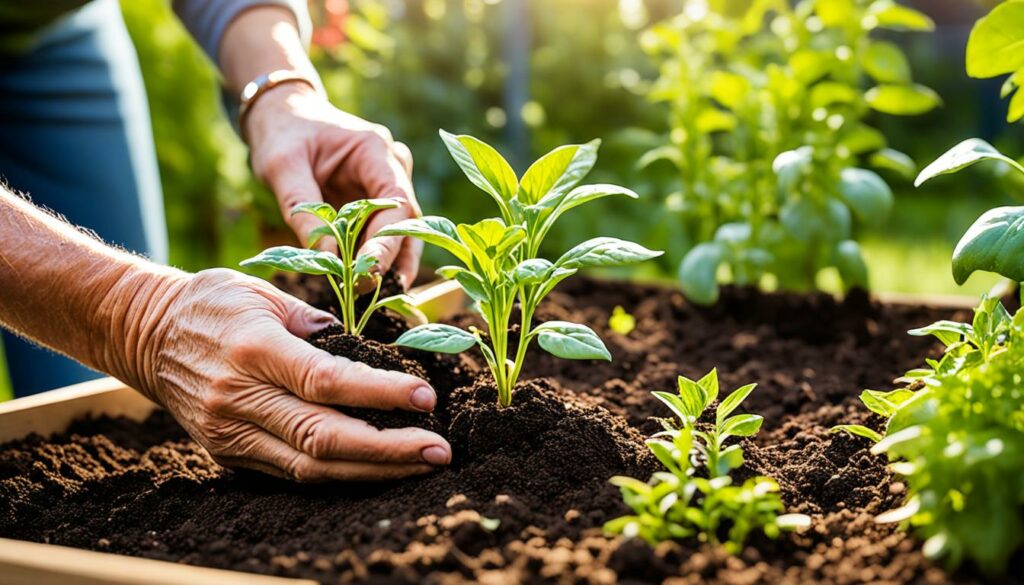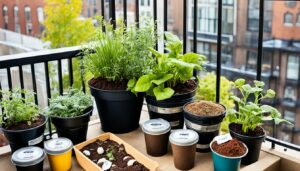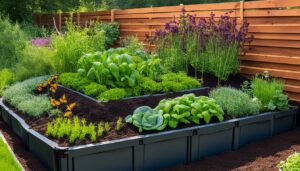An approximate 78% of Americans have reported finding stress relief through home gardening activities. This isn’t a mere trend; it’s a testament to the powerful mental health benefits of plants and the therapeutic benefits of gardening. The act of tending to a garden does more than yield a lush, scenic backyard—it’s a mindful practice knitted closely with our psychological well-being. Reports like “Fairer Society, Healthy Lives” have illuminated the undeniable link between cultivating flora and cultivating a healthier mind.
In an age where the quest to improve mental health through gardening has risen to the forefront, exploring the verdant nexus of horticulture and wellness couldn’t be timelier. Embraced by medical professionals and mental health advocates alike, gardening’s natural restorative powers offer a green oasis in the arid deserts of our bustling lives. From the first sprout to a fully bloomed garden, the act of nurturing nature is silently sowing seeds of emotional resilience and tranquility within us.
Key Takeaways
- Gardening activities have been clinically shown to aid in stress relief and mood improvement, vital for mental health.
- Exposure to green spaces can hasten recovery from medical procedures and improve various health outcomes.
- Indoor plants may enhance worker productivity and mitigate stress in office environments.
- Community gardening initiatives contribute significantly to public health and societal happiness.
- In viewing nature or tending to plants, people experience reduced pain and dementia effects while benefitting from improved psychological states.
- Therapeutic gardening is not just for aesthetic pleasure; it plays a role in heart surgery recovery and improves psychological well-being.
Unearthing the Roots of Happiness: How Gardening Enhances Mental Wellbeing
Recognizing the profound influence gardening has on mental wellness begins with examining the way it supports and nurtures the human psyche. Charles Hall from Texas A&M University illuminates the correlation between interacting with plant life and experiencing heightened psychological health—a testament to the potential of gardening as a therapeutic practice that goes beyond mere hobby.
Connecting with Nature: A Natural Stress Reliever
The simple act of being outdoors and immersing oneself in the natural world has long been celebrated as a method for gardening for stress relief. The serene environment of a garden allows one to connect with the earth, fostering a unique sense of tranquility and reprieve from the rush of modern life. This connection not only diminishes feelings of stress but also enriches one’s overall sense of mental wellbeing.
Cultivating Mindfulness and Presence Through Garden Activities
Gardening encourages a state of mindfulness, beckoning the gardener to live in the present moment. The deliberate motions of planting, weeding, and pruning are acts of intention that pull focus away from everyday distractions. This therapeutic engagement grants a pause to the busy mind, promoting a serene awareness that underscores the benefits of gardening for mental health.
Harvesting Self-Esteem and Accomplishment in the Garden
There’s a special pride that comes with the cultivation of a garden. Each blossom and fruit that springs from patient labor is a testament to one’s commitment, nurturing not only the garden but also one’s self-esteem. This sense of achievement is integral to feeling a sense of purpose and validation, which in turn amplifies feelings of happiness and life satisfaction.
Planting Seeds of Creativity and Memory Retention
As one tends to their garden, they’re also sowing the seeds for a healthier mind. The vibrant colors, diverse textures, and various fragrances stimulate the senses and foster creativity. Beyond aesthetic pleasure, the cognitive challenge of caring for a garden has been linked to improved memory retention, augmenting an individual’s capacity for memory and attention, vital components of gardening and wellbeing.
Gardening Mental Health: Sowing the Seeds of Emotional Healing
In the pursuit of emotional balance and healing, therapeutic gardening emerges as a potent ally. The steady hands of nature guide us through a journey of personal growth, where the nurturing of plants mirrors the nurturing of one’s inner self. Garden therapy offers a refuge from the chaos of daily life, providing a serene backdrop for meditation and mindfulness.
The relationship between gardening and mental restoration is undeniable. Pioneering studies have consistently underscored the importance of green spaces in promoting mental health. Not just a relaxing pastime, gardening is an act of care that reflects back onto the gardener, instilling a sense of peace and well-being.
One doesn’t need to look further than the empirical evidence to understand the profound impact of garden therapy. From alleviating symptoms of PTSD to boosting post-operative recovery, the data illustrates the remarkable benefits of this simple, yet profound, activity. Here are specific ways gardening can improve mental health through gardening:
- Nurturing Growth: The very act of planting seeds and witnessing their evolution into full blossoming plants is a metaphor for growth, fostering personal accomplishment and self-esteem.
- Stress Reduction: Engaging with the earth, feeling its texture, and smelling the subtle scents of nature offer a multisensory experience that soothes the mind and reduces stress levels.
- Mood Regulation: Regular interaction with green spaces has been shown to regulate mood, combating feelings of melancholy and providing a natural antidote to anger.
- Promoting Vitality: The outdoor exercise associated with gardening bolsters physical health, which is intrinsically tied to mental vitality and energy levels.
Therapeutic gardening doesn’t just take place in the confines of one’s own garden. Community gardens serve as communal beacons of tranquility, nurturing social bonds and fostering neighborhood camaraderie. These shared spaces extend the benefits of gardening to a broader demographic, cultivating a collective emotional resilience.
“The glory of gardening: hands in the dirt, head in the sun, heart with nature. To nurture a garden is to feed not just the body, but the soul.” – Alfred Austin
The potential of garden therapy to inspire and heal is boundless. As we continue to explore the connection between horticulture and mental wellness, let’s remember that every plant we tend to is a step towards cultivating a healthier mind and a more harmonious world.

Conclusion
As we find ourselves woven into the living tapestry of our neighborhoods and cities, the immeasurable mental health benefits of plants become apparent in the ways they underpin our social fabric. Community gardens emerge as bastions of inclusion, bridging divides and nurturing the roots of communal understanding. The cultivation of such shared green spaces is more than a pastime—it’s a collective step towards strengthened mental well-being.
Fostering Community and Social Bonds Through Shared Green Spaces
In the diverse ecosystem of a community garden, individuals from a multitude of backgrounds converge, fostering strong social bonds and a harmonious way of living. This form of community garden mental health initiative is a testament to our inherent need for connection—not only to each other but to the earth itself. Through collective efforts in these gardens, we not only plant seeds but also sow the inklings of friendship and empathy, cultivating a sense of belonging and shared responsibility that is vital for mental health.
Gardening: A Growing Solution for Mental Health Enhancement
The act of gardening itself, akin to nurturing one’s well-being, presents a natural solution for mental health enhancement. With every touch of the soil and each sapling nurtured, gardeners partake in a silent dialogue with nature, engaging in a therapeutic exchange that promotes healing, growth, and mental resilience. Whether as a solitary pursuit or a community endeavor, gardening stands as a testament to the profound influence of nature on our mental landscapes. The time has come to further elevate gardening mental health advocacy, ensuring this green prescription gains the recognition it deserves.
Encouraging Continued Research and Advocacy for Therapeutic Gardening
The verdant path of gardening beckons us not simply towards horticultural achievements, but also to a deeper understanding of its therapeutic potential. Continued research in this field is paramount, as it holds the promise of integrating therapeutic gardening more substantially into mental health strategies. Encouraging robust advocacy for these green interventions can open new avenues for healing, offering solace and strength to those whose minds may flourish within the embrace of nature’s care.








